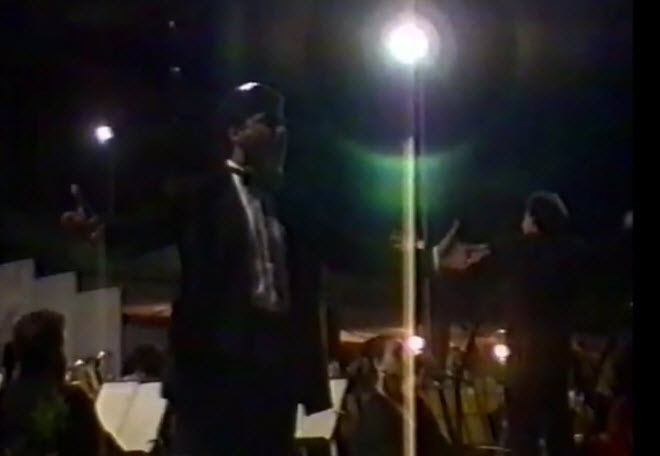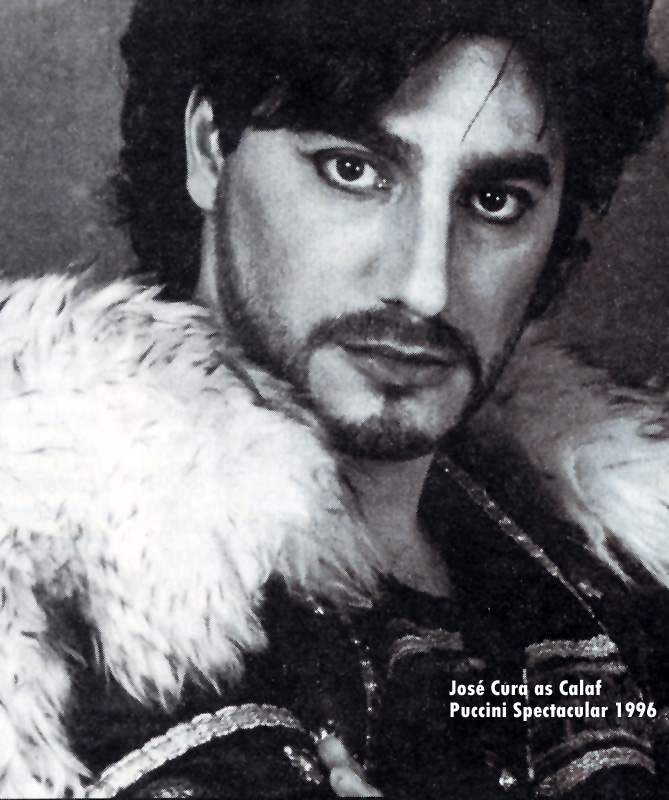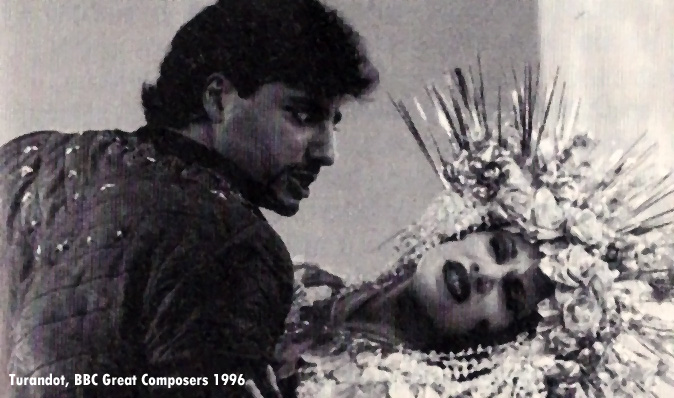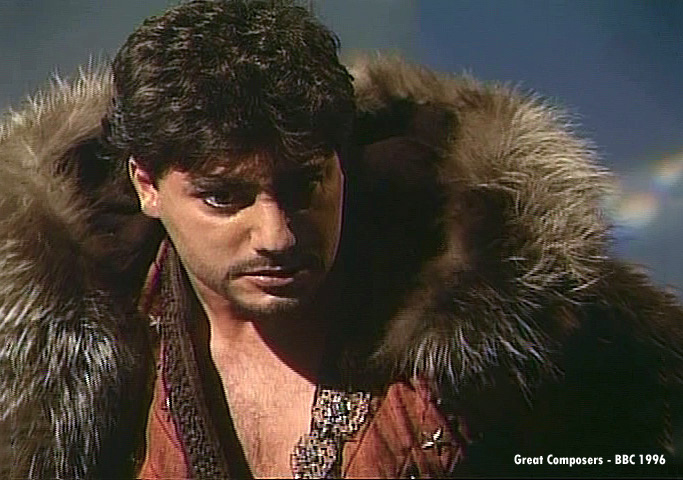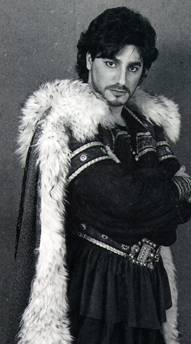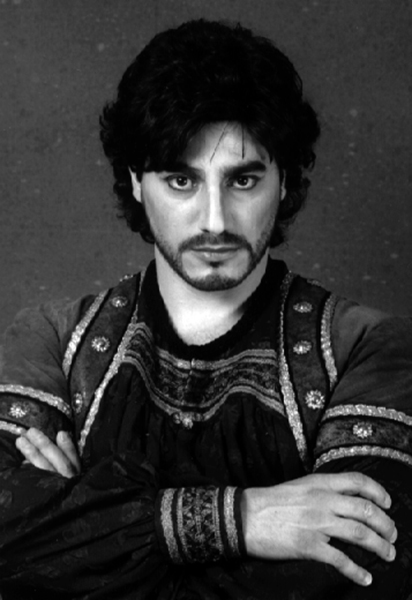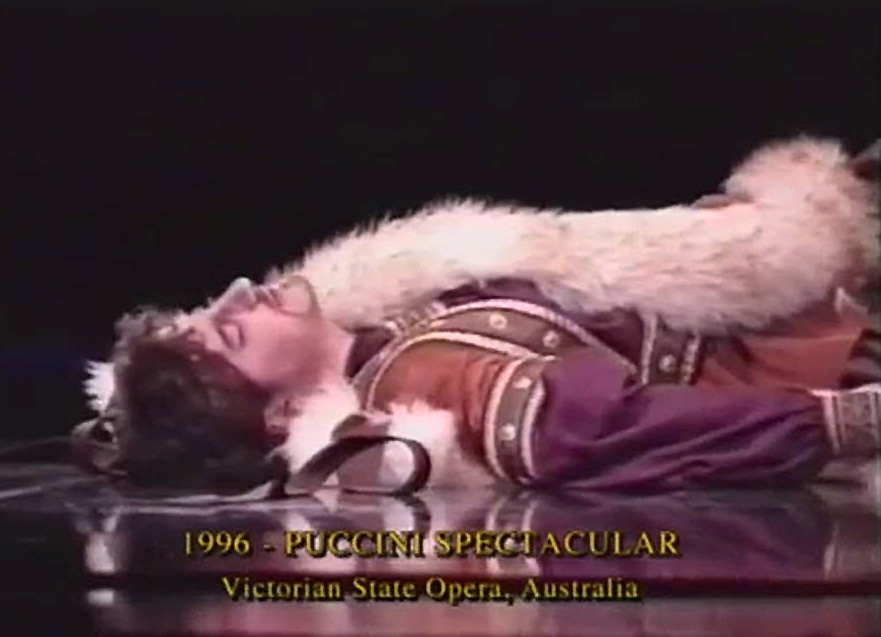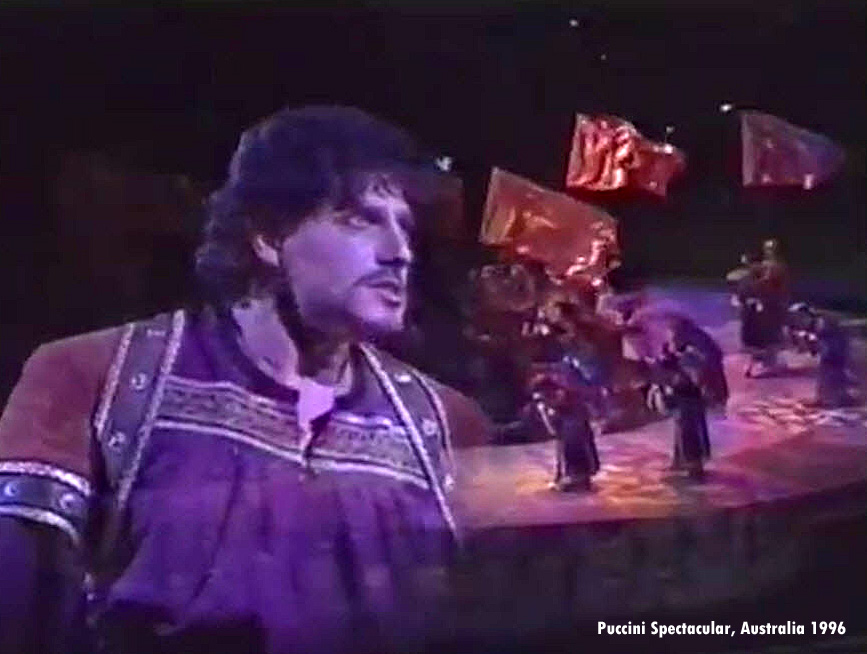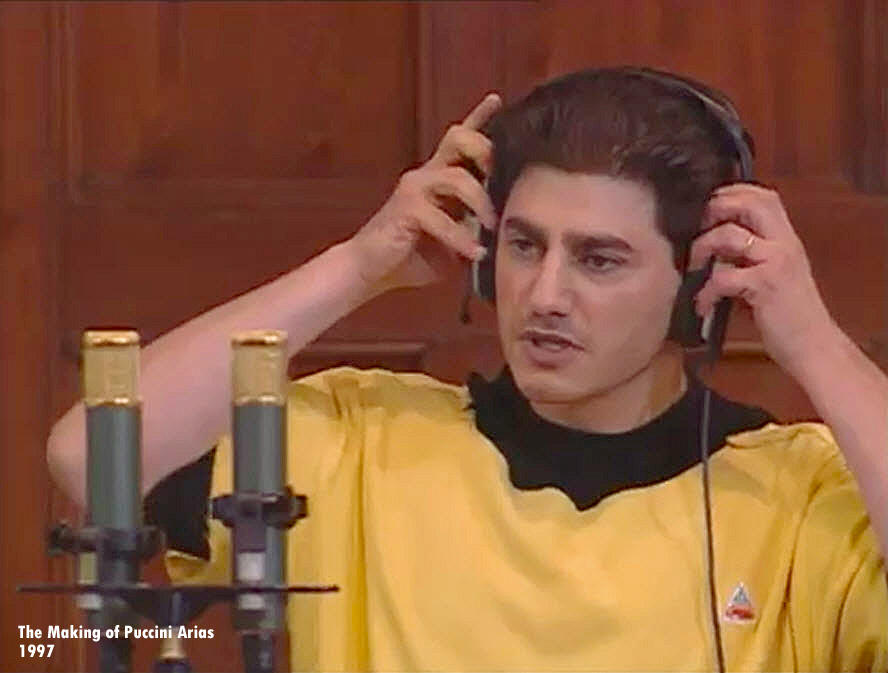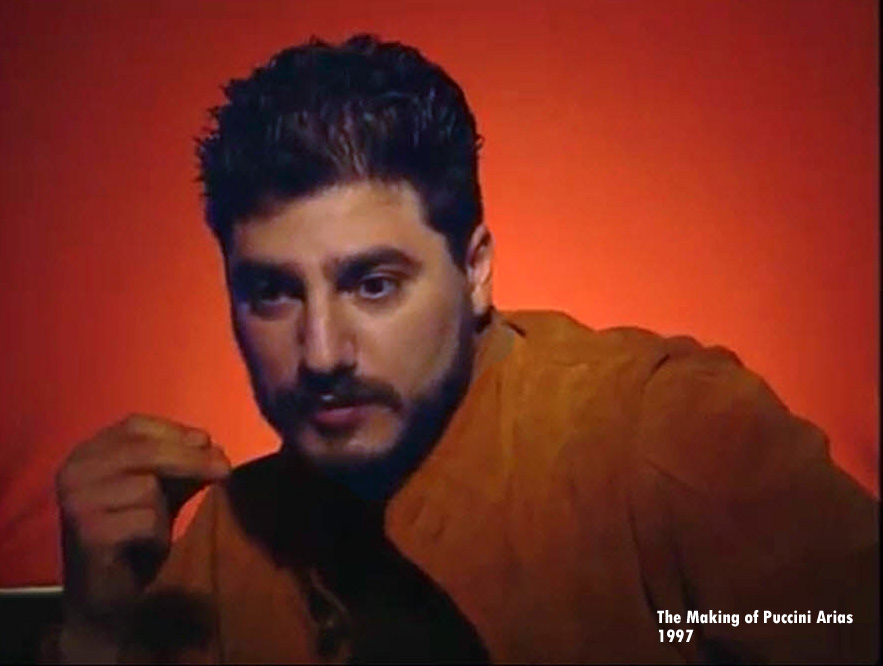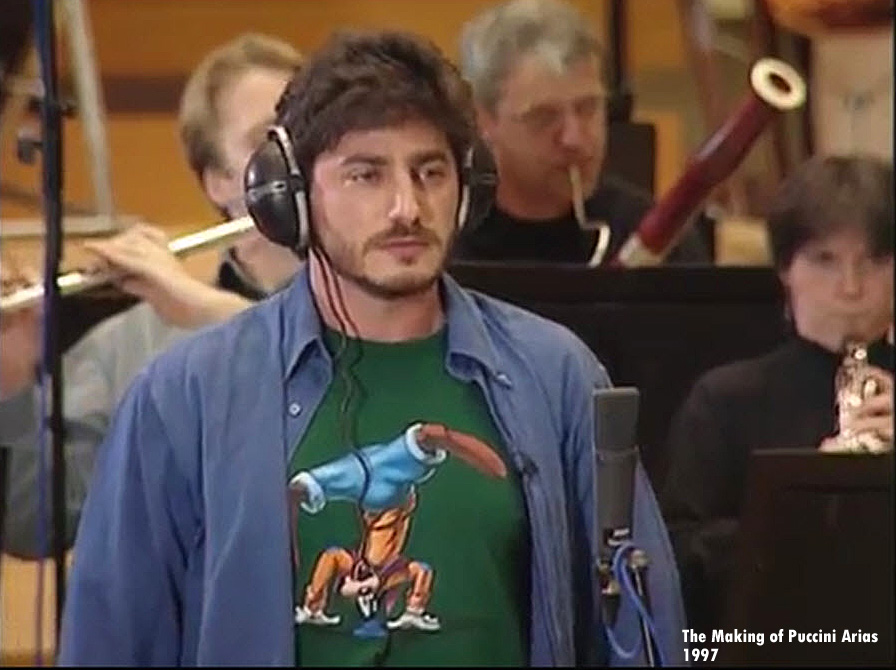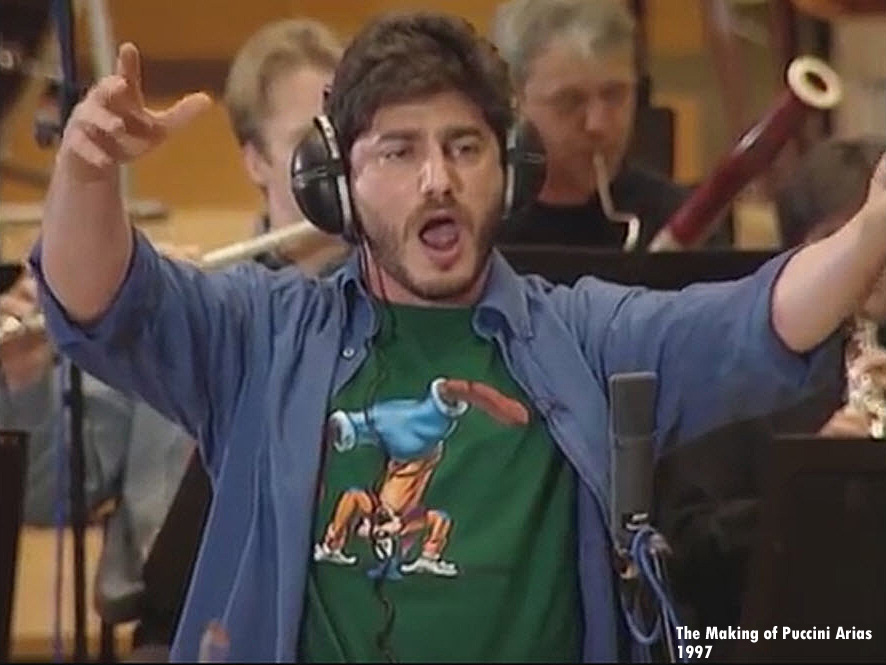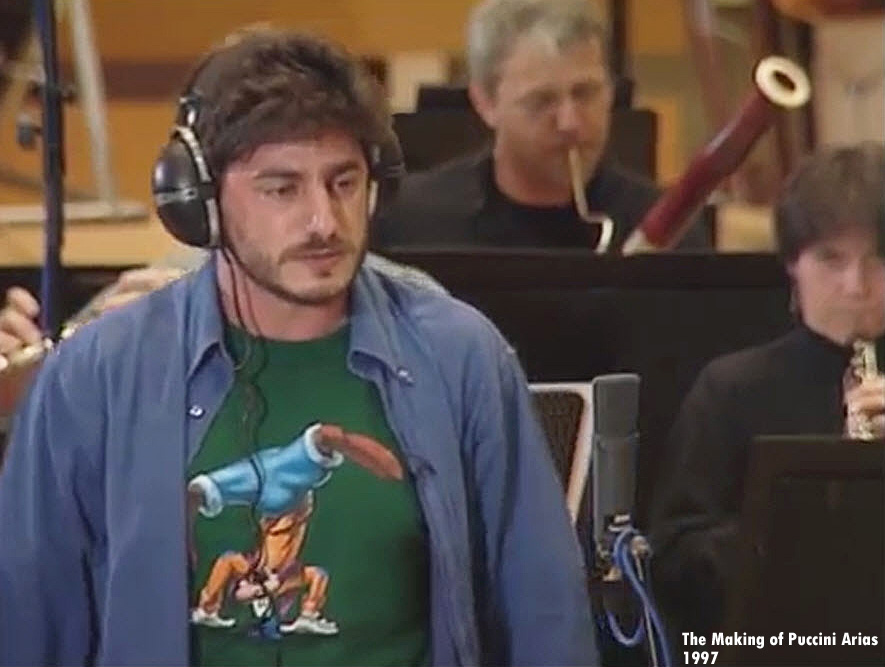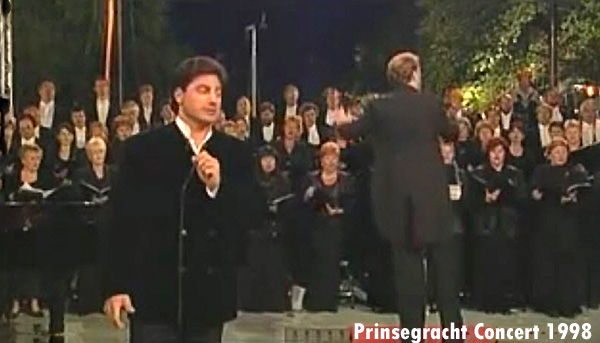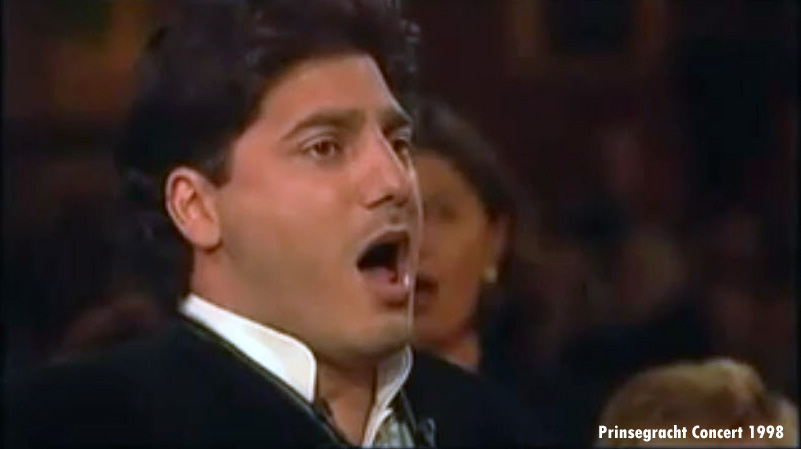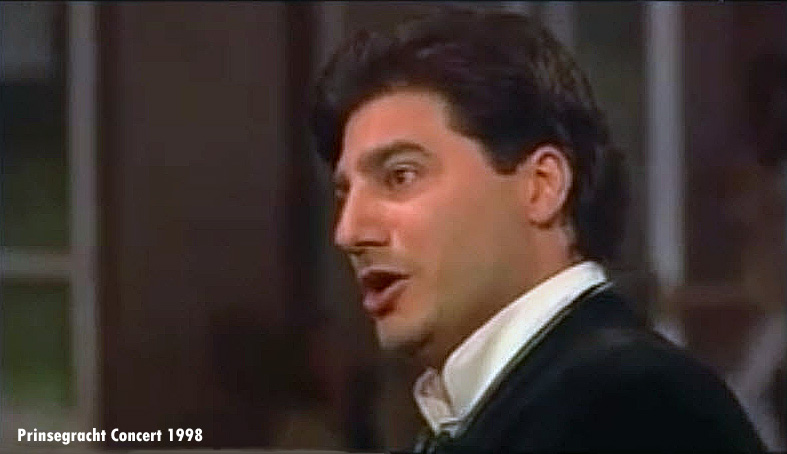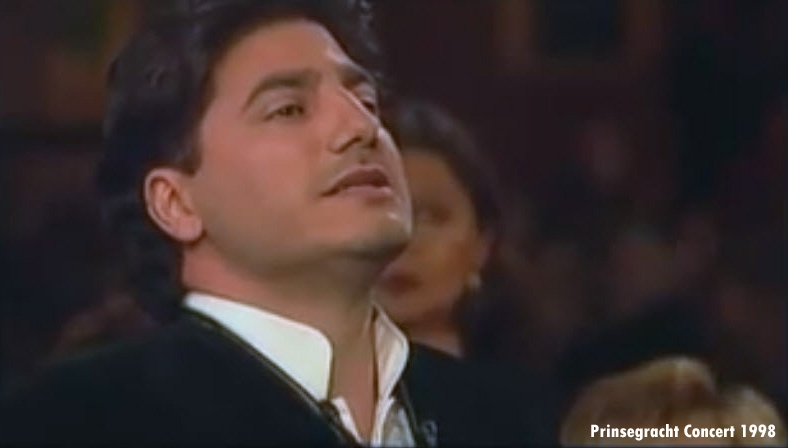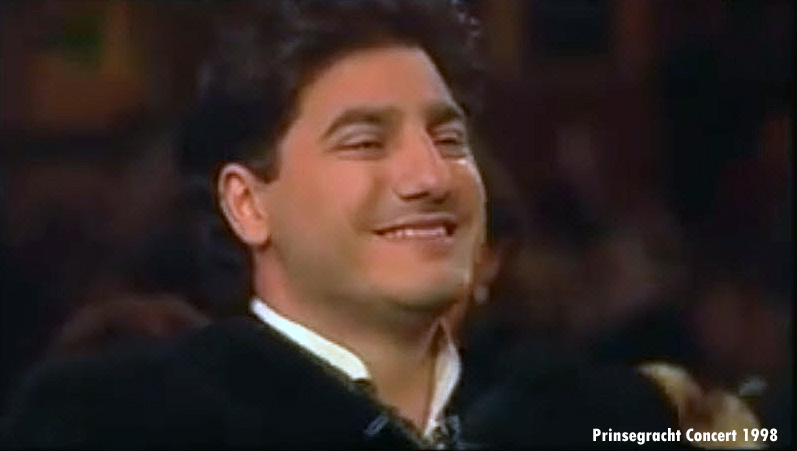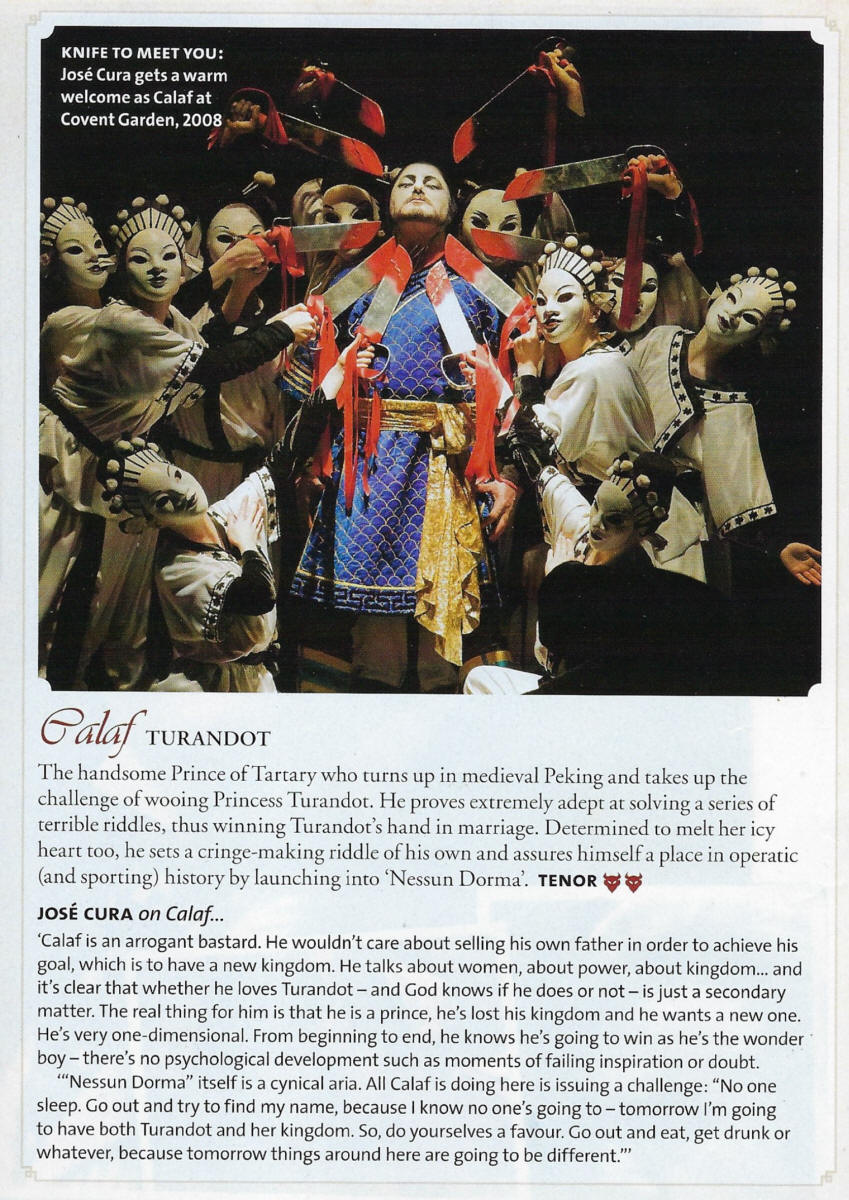
|
Turandot, Verona, 2003: “Sometimes, all you want to say about an evening at the opera is 'Wow!' As Calaf, José Cura's charisma shone from the start, with the size of venue seemingly a perfect match for this great artist. His melodious vocals, with beautifully held top notes, were expertly controlled. ‘Nessun dorma’ was fresh and true, sung with charm and ease - in the spirit of the night, rather than as a challenge or with gusto, as is often the case.” Opera Now, September 2003 Turandot, Verona, July 2003: “[José Cura] fills up the Arena with two words "all'alba vincerò" like a challenge to the entire world, singing supine, with the attitude and the pride of an ancient Roman.” Il Corriere della sera Turandot, Verona, July 2003: “José Cura sings an impeccable Calaf and in 'Nessun dorma' a high B which others can only dream of.” Kurier, June 23, 2003 Turandot, Verona, July 2003: “José Cura's Calaf, in metallic, shining armor, acts the restless, stubborn hero rather than a touchingly radical lover. Since his virile, darkly timbred tenor voice tends to get into trouble in big lyrical arias, he staked everything on one card in 'Nessun dorma' and mastered this, his test, with great bravura. The audience, overwhelmed by this brilliant performance, clapped and cheered already while he was singing the last note.” Süddeutsche Zeitung, June 23, 2003 Turandot, Turin, October 2006: “Highest marks go to José Cura. His Calaf is impetuous, at times rabid. He is extraordinary in ‘Nessun dorma,’ an aria that is often used as a mirror in which tenors admire their skill. But why indeed is it nessun dorma? Nessun dorma because there is an edict from Turandot, the last gasp of her power. Nessun dorma because she wants to discover the identity of Calaf. In the town, then, there is anything but tranquility and sweetness: instead, there is restlessness, apprehension. And in the same way Calaf is not about sweetness but about power: all'alba vincerò -- at dawn, I will win. Vincerò Turandot: the conquest of a fortress rather than the dream of love. In these notes José Cura never looks in the mirror, never tries to simply show off his voice but instead to use it in the service of his goal of conquest, the source of which is barely controlled anger.” Trapsi, 10 October 2006 Turandot, Turin, October 2006: “José Cura is a Calaf without a large voice but one used with great style and one that earned an ovation after the famous aria ‘Nessun dorma.’" La Stampa, Oct 2006 Turandot, Turin, October 2006: “Interesting company, this one....with a prince Calaf in the person of José Cura who attacks notes without much color but with a voice and presence of rare authority." Il Giornale, 16 October 2006 Turandot, Zürich, April 2006: “Outstanding as well was the Calaf of José Cura. This formative “Mätzchen” yielded a musically flawless interpretation. Certainly, one could say that the voice slips now and then into the throat and that somewhat more attention should be given to the vowel placement (particularly in ‘Nessun dorma’), but at this time no other tenor can so easily master this role. The bronze, baritonal voice coloring, paired with an incredible expressiveness and vocal strength and, when necessary, with softness, inspired storms of enthusiasm. The nonchalance in his acting and the ease with which he took the high notes made him the winner of the evening. A tremendous public success.” Vox Spectatricis, 4 October 2006 Turandot, Zürich, April 2006: “I had expected a generous and committed physical performance; I hadn’t anticipated an impeccable vocal one too. Cura can be an annoyingly wayward singer at times, but obviously found this production congenial and was on best behavior. A well-nigh perfect ‘Nessun dorma’ capped an exciting interpretation that played well to Cura’s ebullient Action Man strengths.” Opera Now, September / October 2006 Turandot, Zürich, April 2006: “It [was] easy for José Cura as Calaf to dominate the stage. He takes advantage of it, as he sings ‘Nessun dorma’ while lying outstretched on his back. Although his darkly shaded tenor occasionally lives in a wild a marriage with the song phrases, he is convincing as an actor and his thrilling, daredevil approach. He has class. Much applause in the end, with storms of enthusiasm for everything - the audience liked the performance very much.” Zürichsee-Zeitung, 4 November 2006 Turandot, Zürich, April 2006: “The first performance [in Zürich] of this gigantic opera was a triumph for more than one reason. The first was the music. The second reason was named José Cura. His imposing presence made us think the opera should have been called Calaf, but much of his macho self-approval can be easily pardoned thanks to the charisma that characterizes this artist and the almost insulting brightness of his vocal projection.” Ópera Actual, 9 April 2006 Turandot, Zürich, April 2006: “José Cura was announced as indisposed; coughs and beads of sweat plagued the singer. Nevertheless he was able to inspire and survived to the end in good shape. His ‘Nessun dorma’ was brave and his interpretation was convincing and often amusing. He solved the riddle with a laptop and gave us the best of an earthy and macho but gentle Calaf.” Der Neue Merker, May 2009 Turandot, Zürich, April 2006: “By now, many are eagerly awaiting the Otello premiere on May 30, and the hero of that opera is also already in town. This evening, however, he will not be singing Verdi but Calaf in Puccini's final opera Turandot. The very first confrontation of the two (in Act 2), where Turandot tells the stranger of her obsession with chastity--or rather her hatred of men--by referring to her ancestress Lu-u Ling, turned into the highlight. Two people of steel with equally steely but never painfully harsh voices met eye to eye. Magnificent singing, making the hair on your neck stand on end, afterwards rewarded by a strong burst of applause. And Calaf? He fits into this brutal environment. He falls for Turandot immediately and without restraints, singing (in Italian): "And even if the whole world caves in--I want Turandot." He, who has experienced violence himself due to being exiled, seems to be attracted more by Turandot’ s delight in the senseless exercise of violence than by her much vaunted beauty. He comes as conqueror who wants to break her resistance. This does not look like love. In the third act, the performers repeatedly have to climb across a grid on the floor, something that seems rather a nuisance. This is perhaps meant to overcome old prejudices and practices. Despite this obstacle, we once again experienced the art of singing at its finest. Here Catherine Foster proved that her big voice is also capable of delicate nuances. Cura on the other hand showed himself intensely passionate. While the dead Liu still dangled grotesquely from the gallows, the two confessed their love to each other, a love born of violence. […] Catherine Foster, José Cura and Manuel Uhl were celebrated abundantly with bravos and standing ovations. Rightly so; after all, they presented us with a veritable Songfest at Pentecost.” Der Neue Merker, 23 May 2010 Turandot, Zürich, April 2006: “A frequent visitor to the Zürich stage, José Cura made a strong impression as Calaf. In fine form, the Argentinian tenor sang with dark and vigorous tones and [easily] launched the high notes, even singing ‘Nessun dorma’ lying on his back! In contrast to other recent appearances here, he showed scrupulous attention to style and score. And he had no problem playing the macho lover required by the staging.” ConcertoNet, April 2006 Turandot, Shanghai, February 2007: “[Cura] stretched on the ground to sing his famous aria ‘Nessun Dorma,’ perfectly striking high B. His melodious vocals with beautifully held top notes were expertly controlled.” Shanghai Daily, 10 February 2007 Turandot, Zürich, December 07 / January 08: “The Calaf of José Cura, whose timbre confirms his suitability for Puccini roles, is carefully considered and convincing. Cura, a singer naturally endowed with great stage charisma, is able to give his character creditable phrasing and studied sensitivity, blending everything with an awareness of stage and theater that makes his characters theatrically complete, dramatic and engaging.” L'Opera, February 2008 Turandot, Zürich, April 2006: “José Cura was announced as indisposed; coughs and beads of sweat plagued the singer. Nevertheless he was able to inspire and survived to the end in good shape. His ‘Nessun dorma’ was brave and his interpretation was convincing and often amusing. He solved the riddle with a laptop and gave us the best of an earthy and macho but gentle Calaf.” Der Neue Merker, May 2009Turandot Hannover, December 2008: “This production is just annoying, with no concept, with costumes somewhere between a Chinese restaurant and a pajama party, made bearable only with the excellent musical performances. And those there were on this particular evening. Star tenor José Cura is like the Lance Armstrong of the international opera world, always on the go and powerful when he arrives. [Unfortunate, then, in] Nessun dorma, that aria of arias for tenors, he was a little shaky at the start, then steadied but without the necessary final power. The applause that usually comes here was missing. But the evening was worth every penny! The concept of an opera festival evening with special guest seemed to work, the opera was sold out, and the applause was of Vienna’s level.” Neue Presse, December 2008 Turandot, London, December 2008: “Iréne Theorin sang Turandot without obvious strain, though positioning herself strategically at the front of the stage. She does not have a man-eater of a voice but the top notes arrive with a laser-like brightness. It was José Cura's Calaf who was more inclined to sound under the weather, husbanding his resources through the first half and only trusting his dark Latin tenor to ring out in time for ‘Nessun dorma’.” Financial Times, 3 January 2009 Turandot, London, December 2008: “If the tenor in Turandot is to be judged by ‘Nessun dorma,” then José Cura has truly passed the exam with the note in Covent Garden. Hot, exciting, and restrained, the Argentine shone in the aria that made Pavarotti famous and molded it to suit his voice, adding the cherry to the top of the huge spectacle. A triumph.” El Mundo, 06 January 2009 Turandot, London, December 2008: “I can’t remember the last time such a wonderfully musical Turandot graced the Covent Garden stage. José Cura as Calaf was on top form, producing some spine-tingling sounds and it was a pleasure that he actually sang 'Nessun Dorma' as if it meant something; his sensitive use of vibrato and understanding of the text puts many other tenors to shame and whether displaying his husky baritonal-tenor voice at mezza voce or full throttle, the results were thrilling.” Music OMH, December 2008 Turandot, London, December 2008: “That’s probably about as far as subtleties go in this show, but who can argue with a production as gloriously on-message as Andrei Serban’s classic staging? Here are outsized severed heads spilling silken blood from their mouths, masked grotesques wielding torture implements and a faceless, brown-smocked chorus whose calls for the executioner are much more convincing than their pleas for clemency. Stylized the violence may be, but this is a theatre of cruelty in which only an action man such as José Cura’s Calaf can possibly prosper. Rather than some milksop princeling, Cura plays the part very much as if Andy McNab had stumbled into imperial Peking: that he’s the reason no one’s getting any sleep (‘Nessun dorma’) is clearly a source of macho pride rather than a cue for a moonlit serenade. Pair his lusty but still nuanced tenor with Connell’s Turandot and the result is a visceral battle of wills.” The Times, 27 December 2008 Turandot, London, December 2008: “Any tenor tackling ‘Nessun dorma’ has the colossal shadow of Pavarotti bearing down on him. José Cura need not fear the comparison. He was once touted as the Fourth Tenor and he certainly has the heft and supreme confidence a successful Calaf needs. As he scaled the heights of ‘Nessun dorma,’ his voice, enriched by an impeccably controlled vibrato, was, like the stars of the text, “trembling with love and hope.” Yet it was also rock-solid, more so than the flimsy oriental structure whose pillars he was clutching. Andrei Serban’s 24-year-old production, revived by Jeremy Sutcliffe, is as spectacular as ever and a serviceable vehicle for singing of this quality.” Evening Standard, 23 December 2008 Turandot, London, December 2008: “Partnering Connell as Turandot's final, successful suitor is José Cura's Calaf. There's the odd moment when his interpretative freedom slides into idiosyncrasy, but elsewhere his upfront physicality and bracing tone allow him to hold his own in his vocal wrestling match with Connell.” The Guardian, 5 January 2009 Turandot, London, December 2008: “José Cura’s Calaf was clearly inspired…his dark tenor may sound throaty and forced these days, but vocally and dramatically he seemed more engaged than on opening night…” Opera, January 2009, Hugh Canning Turandot, London, December 2008: “Argentinian tenor José Cura gradually rises to the occasion as Prince Calaf, underpowered to begin with and gaining confidence in much the same way as he did in La Fanciulla Del West. By the time he approaches ‘Nessun dorma,’ he is at full stretch.” Daily Express, December 2008 Turandot, London, December 2008: “Cura’s was a subdued unshowy performance befitting with his perception of Calaf as something of an emotionless ‘bastard’ willing to let Liù die so that he can continue to climb the social ladder. His voice is not lyrical but has a burnished baritonal middle and solid top and the culmination of his performance was an assuredly ardent, if somewhat strangely reflective, ‘Nessun dorma’.” Seen and Heard, December 2008 Turandot, London, December 2008: “How ironic that the one Puccini opera left unfinished at his death should end (or so it was deemed by those responsible for the finishing touches) with what has become the greatest of his hits – ‘Nessun dorma’. It was a good night, too, for José Cura, well suited to the craggy heroics of Calaf, dark and strong in the middle voice and wholehearted in that aria.” The Independent, 23 December 2008 Turandot, London, December 2008: “José Cura is certainly not immune to the temptation of milking this moment, unleashing his longest long note at the ending. Calaf is not the most engaging of heroes; indeed his single-minded pursuit of Turandot at the expense of the more sympathetic Liù makes him decidedly unappealing. Cura’s voice is not perfectly schooled but it has an appealing baritonal timbre and even if he’s occasionally cavalier with note values he does know how to hold a stage.” Musical Source, 23 December 2008 Turandot, London, December 2008: “At the Royal Opera House, Nicola Luisotti stamps his fiery theatrical personality on an otherwise routine account of Turandot, decently but unmemorably sung by a polyglot cast. Illness had struck down Iréne Theorin. Her place as the principessa was taken by Elizabeth Connell, now 62. Unsurprisingly for a singer at this stage of her career, her tone production is variable, coarse and rasping as well as gleaming, but not much more so than that of the considerably younger Cura. He remains a maddeningly uneven artist - casual and uninvolved one moment, on fire the next. He hit his best form for ‘Nessun dorma,’ but a triumphal top C didn’t ignite the audience. If Cura goes beyond clocking in it could prove something special.” The Times, 4 January 2009 Turandot, London, December 2008: “José Cura is an ideal bit of casting as Calaf, the handsome, young "Unknown Prince". A rich sounding tenor with the range to pull off "Nessun Dorma" but the good sense to try and inject drama into everything. It might be an aria that is commonly sung like a battle victory celebration but the words suggest anything but and Cura was more than good enough to make it bitter sweet….A great night out.” The Teenage Theater Critic, 24 December 2008 Turandot, London, December 2008: “José Cura is certainly not immune to the temptation of milking this moment [i.e., Nessun dorma], unleashing his longest long note at the ending. Calaf is not the most engaging of heroes; indeed his single-minded pursuit of Turandot at the expense of the more sympathetic Liù makes him decidedly unappealing. Cura’s voice is not perfectly schooled but it has an appealing baritonal timbre and even if he’s occasionally cavalier with note values he does know how to hold a stage…. This revival is strong and will be enjoyed by any newcomer to the work. Die-hards too will find much to enjoy.” ClassicalSource, December 2008 Turandot, London, December 2008: “The Italian conductor, soon to take the helm at the San Francisco Opera, is clearly not one to wallow in the luxurious colors of Puccini's japonaiserie; from his stern, tense account of the opening he kept the music flowing, pushing each act towards an inevitable conclusion. ‘Nessun dorma’ itself, powerfully sung by José Cura, was shorn of superfluous sentimentality and Luisotti pushed through without affording the audience a chance to break the momentum with their applause. As Calaf, Cura was in fine fettle yet seemed in the first act to struggle to find the most powerful place for his voice to sit. The dark, baritone timbre at times weighed him down, affecting his intonation. He warmed up throughout the evening, though, and was outstanding in a heartfelt but never indulgent account of his big aria. He still has a tendency towards an almost casual manner of delivery that can result in a petulance to his characterization, yet he remains one of only a handful of tenors with a voice that can deliver visceral thrills.” Musical Criticism, December 2008 Turandot, Berlin, April 2010: “By now, many are eagerly awaiting the Otello premiere on May 30, and the hero of that opera is also already in town. This evening, however, he will not be singing Verdi but Calaf in Puccini's final opera Turandot. The very first confrontation of the two (in Act 2), where Turandot tells the stranger of her obsession with chastity--or rather her hatred of men--by referring to her ancestress Lu-u Ling, turned into the highlight. Two people of steel with equally steely but never painfully harsh voices met eye to eye. Magnificent singing, making the hair on your neck stand on end, afterwards rewarded by a strong burst of applause. And Calaf? He fits into this brutal environment. He falls for Turandot immediately and without restraints. He, who has experienced violence himself due to being exiled, seems to be attracted more by Turandot’ s delight in the senseless exercise of violence than by her much vaunted beauty. He comes as conqueror who wants to break her resistance. This does not look like love. In the third act, we once again experienced the art of singing at its finest. Cura showed himself intensely passionate. Catherine Foster, José Cura and Manuel Uhl were celebrated abundantly with bravos and standing ovations. Rightly so; after all, they presented us with a veritable Songfest at Pentecost.” Der Neue Merker, 23 May 2010 Turandot, Mannheim, November 2015: “José Cura is still attractive as Calaf ….Cura, whom was last encountered in Mannheim in an excellent Otello, has the vigor, the brilliance and the power and the glory for that summit operatic hit Nessun dorma….Ten minutes of applause at the end, sometimes even stormy….” Mannheimer Morgenpost, 29 November 2015 Turandot, Liège, September and October 2016: “It stops with the death of Liù, where Puccini stopped. For the new staging of Turandot at Liège, it was decided to present the original unfinished version, as Arturo Toscanini had chosen to direct for the first performance at La Scala in 1926. Tenor José Cura, who plays Calaf but is also the director and creator of production, elected to end with a moving tribute which included the Puccini and his most famous characters who come to accompany him on the last trip. Cura confirmed his perfect mastery of the part [of Calaf] but as a director and set designer showed many ideas, from traditional to modern, mixed together on the scene of a stylized imperial palace.” Il Giornale Della Musica, 26 September 2016
Turandot, Liège, September and October 2016: “Cura was a self-assured, heroic Calaf, capable of compassion and singing with strong, shining, well-controlled tone.” Opera, January 2017
Turandot, Liège, September and October 2016: “Renaissance man José Cura was at once star tenor, director and designer of the show. Cura’s best ideas came in his treatment of Ping, Pang and Pong—a trio of characters who often irritate rather than charm. He treated them as three principal characters of the commedia dell’arte, Pantalone, Arlecchino and Dr Balanzone, before dressing up in their official Chinese costumes for the riddles. This brought a darker brooding quality to the trio, who were even touching as they spoke of their past lives, led by the excellent baritone Patrick Delcour as Ping. Tenor Cura was in his very best form, however, with a secure heroic presence, and a roof raising Nessun dorma. This was an evening of traditional vocal values, worthy of the artist who had made a number of appearances for this company.” Opera News, November 2016
Turandot, Liège, September and October 2016: “[Rightly celebrated], of course, was José Cura, who not only directed the production but also sang Calaf. Cura is still one of the leading tenors of our time and demonstrated that by singing the role with powerful brilliance.” BRF, 26 September 2016
Turandot, Liège, September and October 2016: “More than merely slavish illustration, José Cura succeeds in recovering the “Turandot tone” so unique to Puccini’s career and so difficult to define: that of an epic choral work in which China unfolds in all its magical sensuality but also its cruelty. At the same time, the kitsch—a pitfall so common when it comes to Asia—is avoided by thorough work on lighting and costumes. The ingenious way in which the children’s choir is integrated into the action deserves to be highlighted. José Cura has lost (almost) nothing from his glorious period on discs in the late 1990s, where he played the chained Samson and Pagliacci without flinching. The voice is always ample, fastened to physical and technical bases at all times. He must be seen on stage, his legs slightly spread, his neck tucked between his shoulders, beginning to roar like a wildcat. His timbre has a baritone coloring, along the lines of a Ramon Vinay, at the same time having the ability to go for the high notes without bleaching his voice. In conclusion, this Turandot was a captivating show, one which opened with great fanfare the opera season at Liège. The bar has been placed very high for the sequel.” Forum Opéra, 23 September 2016
Turandot, Liège, September and October 2016: “José Cura was a first-rate Calaf, with a vocal palette of warm, baritonal colors and a very natural stage presence.” Opera On Line, 1 October 2016
Turandot, Liège, September and October 2016: “The success [of this Turandot] is guaranteed, of course, when Cura uses his powerful and radiant voice—and not only when he triumphs in the famous Nessun dorma. He is the star of the evening. The audience offered thanks for the musicality, production, and cast that towers over others.” Opernnetz, 23 September 2016
Turandot, Liège, September and October 2016 // Director: “José Cura, one of the best-known tenors in the Italian repertoire, is also one of the few singers who can assert himself as a director and, in doing so, look far beyond the bounds of the singer's life. The tenor is now in Liège, where he not only directs Puccini's last opera, Turandot, but also creates the stage design and performs the role of Calaf. Cura’s production offers more than just an exotic, colorful or irrelevant chinoiserie. Although he remains loyal to the spirit of Carlo Gozzi’s fairy-tale character, his reading suggests that it is a passionate plea for the inviolability of true love. And Cura celebrates the slave, Liù, who dies for her love, not the cold-blooded Chinese princess. Consequently, he ends with the fragment of the unfinished and renounces the sumptuous wedding and happy-ever-after ending of the blue-blooded princely couple that Franco Alfano added after Puccini's death. Cura’s work ends with the tragic yet tender death of the Liù, the last original sounds from the composer's pen.” Opernnetz, 23 September 2016
Turandot, Liège, September and October 2016: “Musically, the evening was at a high level. Not only does Cura prove he has a compelling approach as a director to Puccini's unfinished opera but he also excels in the demanding role of Prince Calaf. With tenoral sheen and a furious "Vincerò", he recreates the famous Nessun dorma and works with the conductor to rush forward so that applause does not interrupt the musical flow. This comes after Calaf's Non piangere, Liù in the second act in which Cura sings with moving passion and magnificent high notes. At the end there was long-lasting and frenetic applause for everyone involved. Bottom line: José Cura once again proves his versatility in Liège, not only as a singer in Puccini's Turandot, but also as a director who brought a convincing approach for completion of the work.” Online Musik Magazin, September 2016
Turandot, Liège, September and October 2016: “Vocally, the heroic tenor embodied a committed Prince Calaf, from his crazy gamble at the end of the first act, punctuated by three great gong strokes, through his long-awaited Nessun dorma with its final, long held "Vincero." A masterful production.” Crescendo, 11 October 2016
Turandot, Liège, September and October 2016 // Director: “The famous - and often sulphurous - director Calixto Bieito had already tried to bring an original solution to the unfinished finale of Puccini's Turandot: in Toulouse, in 2015, he let the singers finish the performance in evening dress. Here in Liège, José Cura goes further: he radically removes the usual Alfano finale and leaves the score in the state it was in on November 29, 1924, the day of Puccini's death in Brussels. The opera ends with the death of Liu. During the brief lament that follows, Timur transforms into ... Puccini, who stretches and dies among his [opera] characters. A little girl crosses his hands on his chest. The moment is moving. The Argentine tenor is an excellent director, which the Liege audience had already noted in his diptych Cav / Pag. Struck by the Imperial Gate at the Forbidden City in Beijing, Cura recreates it in a sober way: a U-shaped building, leaving a place for the choir, essential character of the work, and placed simply to the left and to the right of the gate. The management of actors is effective; as a bonus, lights (Olivier Wéry) and costumes (Fernand Ruiz) make an important contribution to the oriental atmosphere. Except for a few puerile details (ministers undressing to reveal underwear inspired by comic books, large multicolored plastic balls representing the jewels offered to Calaf), the visual aspect was a new stage success for Cura. A masterful production.” Crescendo, 11 October 2016
Turandot, Liège, September and October 2016: “Dramatic tenor José Cura was both the opera’s hero Calaf and stage director. The Argentine tenor opted to do away with the typical clutter and chinoiserie that is the norm in productions of Puccini’s last work and masterpiece. Drawing on the fairy tale origin of the story, Cura sets the piece as a school project by children who design a Forbidden City using Lego, design the costumes including those of their teacher and narrator who is transformed into the Mandarin. [As a singer] José Cura had the humility to not put himself at the center of the production: he underplayed his role to focus on Turandot and Liù, thus emphasing the dark and light sides of desire. Cura had the required heroic voice and had no difficulty with the high notes [and with] the color of a true dramatic tenor.” ConcertoNet, September 2016
Turandot, Liège, September and October 2016: “José Cura played the leading male role, Calaf, son of Timur. He has deservedly received many awards and it is not surprising that he has been Kammersänger of the Viennese Opera since 2010. As a specialist in Verdi and Puccini, he took on this role with the necessary strength, desire and love, radiating a measured dramatic effect. He voiced all the vocal qualities in a magisterial way, without exaggeration in the high notes. Turandot is vocally a very difficult opera to sing because of the sometimes extremely heavy, rapidly changing vocal parts where technically the extreme is required. For Calaf, this was not a problem and José Cura may be safely counted as among the best interpreter of this role. [At the end] there was only one possible conclusion: this Turandot was without a doubt a splendid accomplishment that could equal that of the Scala or the Met. Performances of this level place the Opéra Royal de Wallonie Liège on a larger international level and make us want to attend other productions of this opera house.” Klassiek-Centraal, 11 October 2016
Turandot, Liège, September and October 2016 // Director: “In Liege not only was pure Puccini performed, but it became a true Puccini party. The staging and decors were completely suggestive, not excessive as sometimes happens in Butterfly or Turandot. Responsible for this was the Argentine Cura, who not only made himself credible as a world-famous dramatic tenor but also acts as a conductor (his original training), composer, set designer and photographer. Costumes and decors were as good as they were tasteful and the dramatic movements were evocative and expressive where necessary. The choir acted as an independent character, as in a Greek drama—again a perfect choice by Cura. Although Puccini wrote for a large number of voices here, this approach (with the chorus grouped and raised) was better; the attention remained with the three central players, Calaf, Turandot and Liù, the choir and orchestra. The only possible conclusion: this Turandot was without a doubt a splendid accomplishment that could equal that of the Scala or the Met. Performances of this level place the Opéra Royal de Wallonie Liège on a larger international level and make us want to attend other productions of this opera house.” Klassiek-Centraal, 11 October 2016
Turandot, Liège, September and October 2016: “Faithful servant of Puccini, José Cura was here in more than one role. Indeed, although the Argentinean is known for his operas, perhaps some are unaware that he composes, conducts, and for the last ten years has been staging operas. He does so with seriousness and intelligence. In reference to the original fable, Cura convened a group of children, who through a series of fun activities (painting, Legos, and so on) on the front edge of the stage announced the book ("Dal deserto al mar"). Rather than spreading outward, the Imperial City rose toward the rafters to allow the choir to be placed in the side galleries and ‘buried’ dungeons in the stage floor with little more than the torsos of the prisoners shown—creating an ingenious sounding board as much as a symbolic jail. While the students dress their teacher as the Mandarin, three accomplices wearing the masks usually associated with Commedia dell'arte arrived to further connect reality and fantasy as the Ministers [Ping/Pang/Pong]. They offered the comic touch (phallic sword, Spiderman t-shirt)… Dressed without exotic kitsch, strong singers surrounded José Cura (Calaf), a tenor of flawless strength but with heartbreaking tenderness when he whispered Dimmi il mio nome.” Anaclase, 27 September 2016 |
